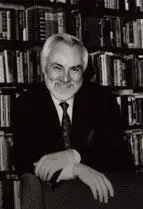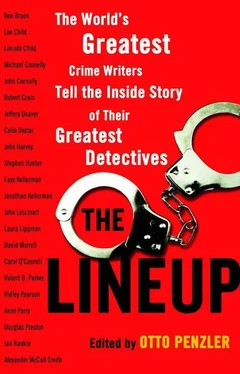One of these is cake. She very much enjoys the fruit cake served by the matron of the Orphan Farm, Mma Silvia Potokwani. And as a result of this sort of enthusiasm, she is what she calls traditionally built. This means that she is pretty fat, but she believes that a better way of describing it is traditionally built.
I am often thanked by people for inventing the term traditionally built. The people who give me thanks for this are often traditionally built themselves.
Mma Ramotswe has never been out of Botswana, other than to make a couple of very short trips into South Africa, next door. She has never seen the sea, which she sometimes dreams of seeing. She likes to imagine the sound the sea would make, which she believes is like the sound of wind in the leaves of eucalyptus trees.
In spite of never having traveled, she has a profound understanding of human nature. She knows all about the weaknesses of men, but she does not condemn men for them. She understands how hard it is to be a man. She disapproves of boastful talk. She is modest. She is generous. She has a very soft heart for those who are heavily burdened.
In one of the books she goes to Mokolodi, a small game reserve near Gaborone. There she sees two American women sitting together. She realizes that one of them looks very emaciated-she is obviously ill. Her friend confirms this. They are doing a final journey together. Mma Ramotswe embraces the sick woman and comforts her. Then she says good-bye to her in Setswana, because that is the language that her heart speaks. She turns away and weeps.
Mma Ramotswe would have time for all of us. She would comfort any of us in our sorrow.
It is apparent to anybody reading these books that I have affection for Botswana. That is true. I admire the country greatly. I admire the many fine values that one can find in so many people in that part of the world, and also in other countries in Africa. People must not think that Africa is a disaster, that it is a broken continent. It is not. There is still a great deal to be admired and cherished there.
Some people have described these books as a love letter to a country. Yes, they are. They do amount to a love letter, and it is a love letter to which I am proud to sign my name.
COPYRIGHT ACKNOWLEDGMENTS
“Jack Taylor,” copyright © 2007, 2009 by Ken Bruen. Originally published by The Mysterious Bookshop.
“Jack Reacher,” copyright © 2007, 2009 by Lee Child. Originally published by The Mysterious Bookshop.
“Hieronymus Bosch,” copyright © 2007, 2009 by Michael Connelly. Originally published by The Mysterious Bookshop.
“Charlie Parker,” copyright © 2008, 2009 by John Connolly. Originally published by The Mysterious Bookshop.
“Elvis Cole and Joe Pike,” copyright © 2007, 2009 by Robert Crais. Originally published by The Mysterious Bookshop.
“Lincoln Rhyme,” copyright © 2007, 2009 by Jeffery Deaver. Originally published by The Mysterious Bookshop.
“Inspector Morse,” copyright © 2007, 2009 by Colin Dexter. Originally published by The Mysterious Bookshop.
“Charlie Resnick,” copyright © 2008, 2009 by John Harvey. Originally published by The Mysterious Bookshop.
“Bob Lee Swagger,” copyright © 2007, 2009 by Stephen Hunter. Originally published by The Mysterious Bookshop.
“Peter Decker and Rina Lazarus,” copyright © 2008, 2009 by Faye Kellerman. Originally published by The Mysterious Bookshop.
“Alex Delaware,” copyright © 2008, 2009 by Jonathan Kellerman. Originally published by The Mysterious Bookshop.
“Dismas Hardy,” copyright © 2008, 2009 by John Lescroart. Originally published by The Mysterious Bookshop.
“Tess Monaghan,” copyright © 2007, 2009 by Laura Lippman. Originally published by The Mysterious Bookshop.
“Rambo,” copyright © 2008, 2009 by David Morrell. Originally published by The Mysterious Bookshop.
“Mallory,” copyright © 2007, 2009 by Carol O’Connell. Originally published by The Mysterious Bookshop.
“Spenser,” copyright © 2007, 2009 by Robert B. Parker. Originally published by The Mysterious Bookshop.
“Lou Boldt,” copyright © 2008, 2009 by Ridley Pearson. Originally published by The Mysterious Bookshop.
“Charlotte and Thomas Pitt,” copyright © 2006, 2009 by Anne Perry. Originally published by The Mysterious Bookshop under the title “Thomas and Charlotte Pitt.”
“Aloysius X. L. Pendergast,” copyright © 2008, 2009 by Douglas Preston and Lincoln Child. Originally published by The Mysterious Bookshop.
“John Rebus,” copyright © 2007, 2009 by Ian Rankin. Originally published by The Mysterious Bookshop.
“Precious Ramotswe,” copyright © 2008, 2009 by Alexander McCall Smith. Originally published by The Mysterious Bookshop.
OTTO PENZLER is the proprietor of The Mysterious Bookshop in New York City. He has founded several mystery-focused imprints, including The Mysterious Press, Otto Penzler Books, and The Armchair Detective Library. He has also edited many mystery anthologies, including the Best American Mystery Stories series, and co-wrote the Encyclopedia of Mystery and Detection, which won an Edgar
®Award. He has won the Ellery Queen Award and the Raven Award from Mystery Writers of America for his exceptional contributions to mystery editing, publishing, and bookselling.

Otto Penzler is the proprietor of The Mysterious Bookshop in New York City. He was the publisher of The Armchair Detective, the Edgar-winning quarterly journal devoted to the study of mystery and suspense fiction, for seventeen years. Mr. Penzler was the founder of The Mysterious Press, which has now become part of the Warner publishing empire; he also created the publishing firm of Otto Penzler Books, which is now an imprint at Carroll & Graf, and The Armchair Detective Library, a publishing house devoted to reprinting classic crime fiction for the collector and library markets.
***















